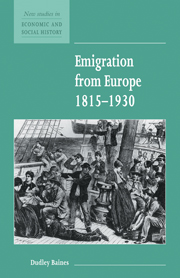Book contents
- Frontmatter
- Contents
- 1 Problems in the history of European emigration, 1815–1930
- 2 Sources of historical information
- 3 Emigration and economic change in Europe
- 4 Emigration regions
- 5 Return migration
- 6 Did emigration change in character?
- 7 Assisted emigration
- 8 Emigration and urban growth
- 9 The economic effects of immigration
- 10 The family and assimilation
- 11 The end of mass emigration
- Conclusion
- Select Bibliography
- Index
- New Studies in Economic and Social History
- Studies in Economic History
- Economic History Society
Conclusion
Published online by Cambridge University Press: 05 June 2012
- Frontmatter
- Contents
- 1 Problems in the history of European emigration, 1815–1930
- 2 Sources of historical information
- 3 Emigration and economic change in Europe
- 4 Emigration regions
- 5 Return migration
- 6 Did emigration change in character?
- 7 Assisted emigration
- 8 Emigration and urban growth
- 9 The economic effects of immigration
- 10 The family and assimilation
- 11 The end of mass emigration
- Conclusion
- Select Bibliography
- Index
- New Studies in Economic and Social History
- Studies in Economic History
- Economic History Society
Summary
Emigration was a very widespread phenomenon in the nineteenth and early twentieth centuries which makes it very difficult to explain. Several universal explanations have been offered, including the development of the international economy and the desire of individuals to improve their economic and social conditions. These explanations are true but trivial. They could apply to almost everything that was happening in the period.
The big problem is to explain the incidence of emigration – assuming that we are able to measure it. We may be able to explain to our own satisfaction the reasons for the emigration of one group. But what if an apparently similar group did not leave? The more we know about other regions, not to say other countries, the more partial our explanations become. But the comparative method, although difficult, is the one that yields the insights. In other words, it is because it is difficult to make generalisations about emigration history that it is an interesting and important subject.
We still have a lot to learn, including more about the basic quantities. For example, what was the relationship between internal migration and emigration? We also need more micro-studies – detailed analyses of the experiences of limited numbers of people. The traditional methods of the historian can tell us more about motivation, especially if they are fortified by some use of theory. But questions about motivation are notoriously difficult to answer.
- Type
- Chapter
- Information
- Emigration from Europe 1815–1930 , pp. 70Publisher: Cambridge University PressPrint publication year: 1995

